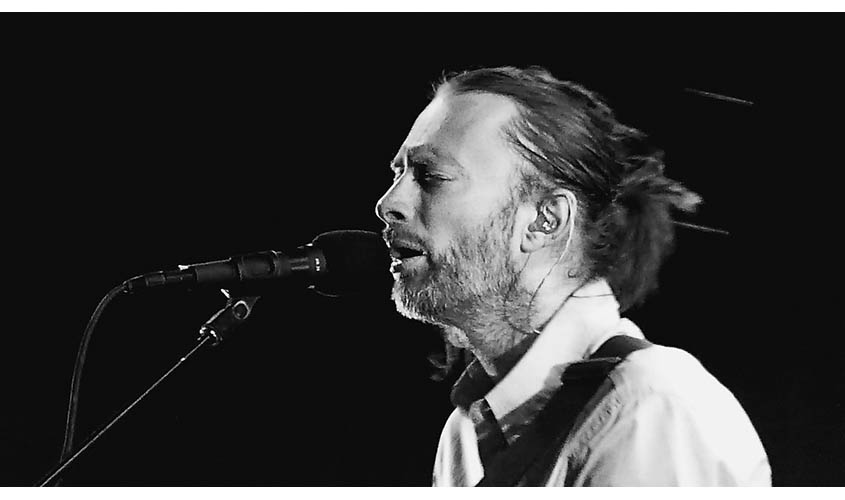Thom Yorke’e much-awaited solo album, Anima, teeters on a psychological divide between intellectually informed glumness and the physical pleasures of rhythm, writes Jon Pareles.
There’s a certain wry comedy in “The Axe”, which arrives near the end of Thom Yorke’s new solo album, Anima. For well over a minute, slow keyboard chords waver in and out of tune as a distant electronic pulse twitches and a muffled, irregular kick-drum beat agitates from below. “Goddamned machinery, why don’t you speak to me?” Yorke eventually sings.
In his melancholy croon, he’s berating his electronic instruments for not supplying inspiration: “I thought we had a deal,” he moans. Yet as he complains, the instruments are working desperately to please, their sounds swarming around him: multiple varieties of handclaps, little ribbons of countermelody, tones that hover and undulate, quiver and plink. How much more does he want?
It’s not as if he’s suffering from writer’s block. Between albums with his main band, Radiohead —lately every four or five years, followed by tours—he has made solo albums and toured on his own. Last year he released a soundtrack for the horror film Suspiria. With “The Axe” and another new song, “I Am a Very Rude Person,” he suggests that the malaise, estrangement and dread that fill so many of his songs are not all-consuming. He has found something he can be lighthearted about: the artistic process.
Yorke has made all of his solo albums (except for the Suspiria soundtrack) with Radiohead’s producer, Nigel Godrich. But Yorke’s albums distance themselves from Radiohead with a self-imposed musical austerity; they rely almost entirely on keyboards and electronics, although guitars aren’t completely ruled out. Austerity doesn’t mean emptiness. Yorke and Godrich revel in subtle, complex, changeable layerings and richly shadowy sounds.
With those electronics—that machinery—Yorke’s solo songs determinedly probe the ways pop forms can dissolve into looping, open-ended electronic tracks, even dance music. Yorke and Godrich also tend to destabilise the machinery, juxtaposing the exact repetition of loops with individual variations.
The songs teeter on a psychological divide between intellectually informed glumness and the physical pleasures of rhythm. “Traffic” opens the album with a dance track pulling against itself; as Yorke sings scornfully about rich people’s indulgences, blurry, viscous bass tones do their best to drag down perky drumbeats and handclaps. And “Runwayaway” concludes the album—after an extended prelude of meditative guitar picking—with a crisp techno beat and minor-key melodies behind an altered voice repeating, “That’s when you know who your real friends are.” On Anima Yorke also allows himself to use an orchestra, mostly of eerily sustained or swooping string ensembles arriving out of nowhere, as he did with orchestral interludes for Suspiria. In “Not the News”—a brisk, blipping immersion in alienation—he flaunts them, singing, “Cue the sliding violins in sympathy.”
The album’s title, Anima, comes from the psychology of Carl Jung. He defined the anima as a person’s unconscious inner self, as opposed to the outward-facing persona, the animus; it’s also the feminine counterpart of a man’s consciousness, the yin to the yang. Yorke is releasing Anima alongside a 15-minute Netflix film by Paul Thomas Anderson that’s set to three songs from the album. It’s a surreal romance, from eye contact on a subway to tender choreographed embraces; it’s also a dance-drama of sleepwalking commuters and treacherous gravitational shifts, with Yorke defying herd impulses to connect with a special woman.
In other words, he’s pushing beyond solitude. Anima glances, obliquely and guardedly, towards love songs. “Dawn Chorus”, the conclusion of the Netflix film, sets aside the steady programmed beats that pace most of the album; it’s one of Yorke’s hesitant keyboard ballads, accompanying his voice with stark two-note counterpoint, speeding up and slowing down as he wonders about second chances, though he envisions a reunion as ashes stirred up by the wind.
In “Twist”, the singer has been rescued by “you who brought me back to life” with “just enough love to go ’round.” Yorke’s falsetto melody is doleful, but it floats over an upbeat, ever-evolving rhythm track that starts with samples of him saying “twist” and grows ever more optimistic. A brisk beat, sampled from Radiohead’s drummer Phil Selway, propels “Impossible Knots” from misgivings—“I’m heading in the wrong direction”—to a cautious affirmation: “I’ll take anything you got/I’ll be ready.” Yorke’s perpetual dread hasn’t disappeared by any means. But on Anima, he’s holding it at bay.
© 2019 The New York Times

